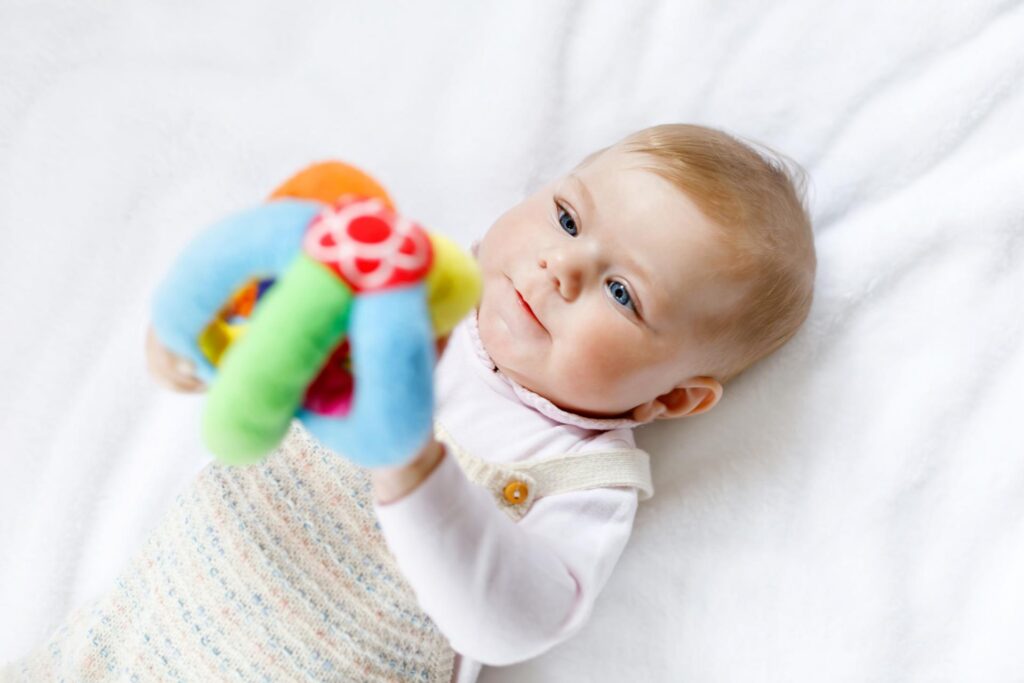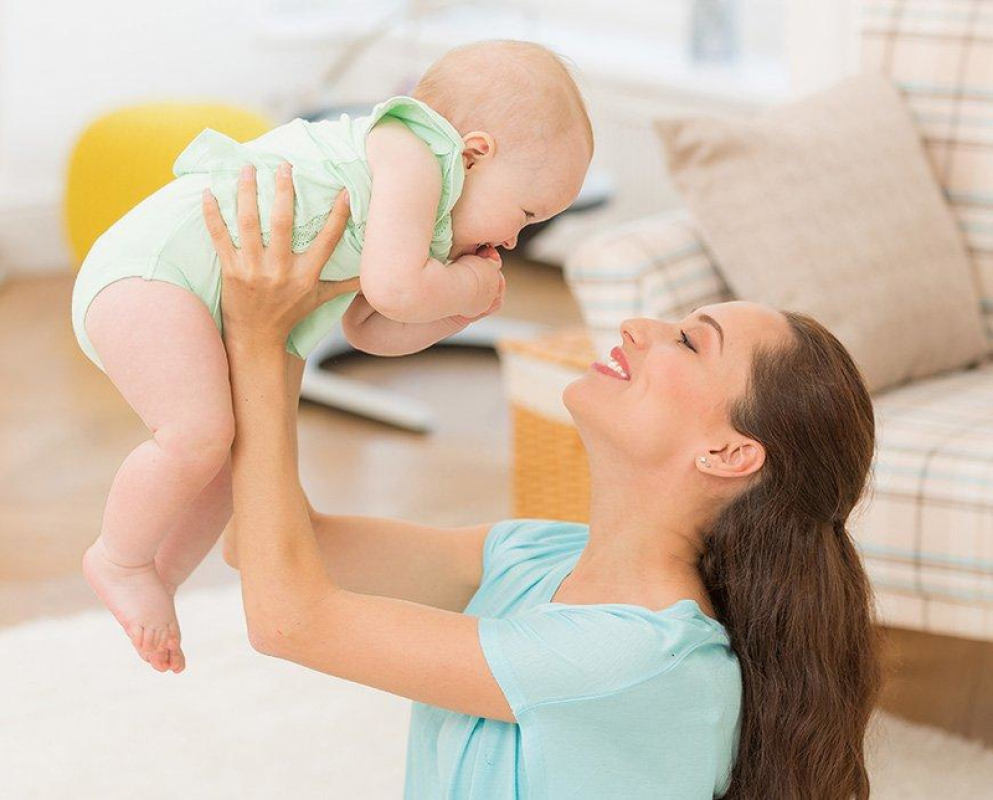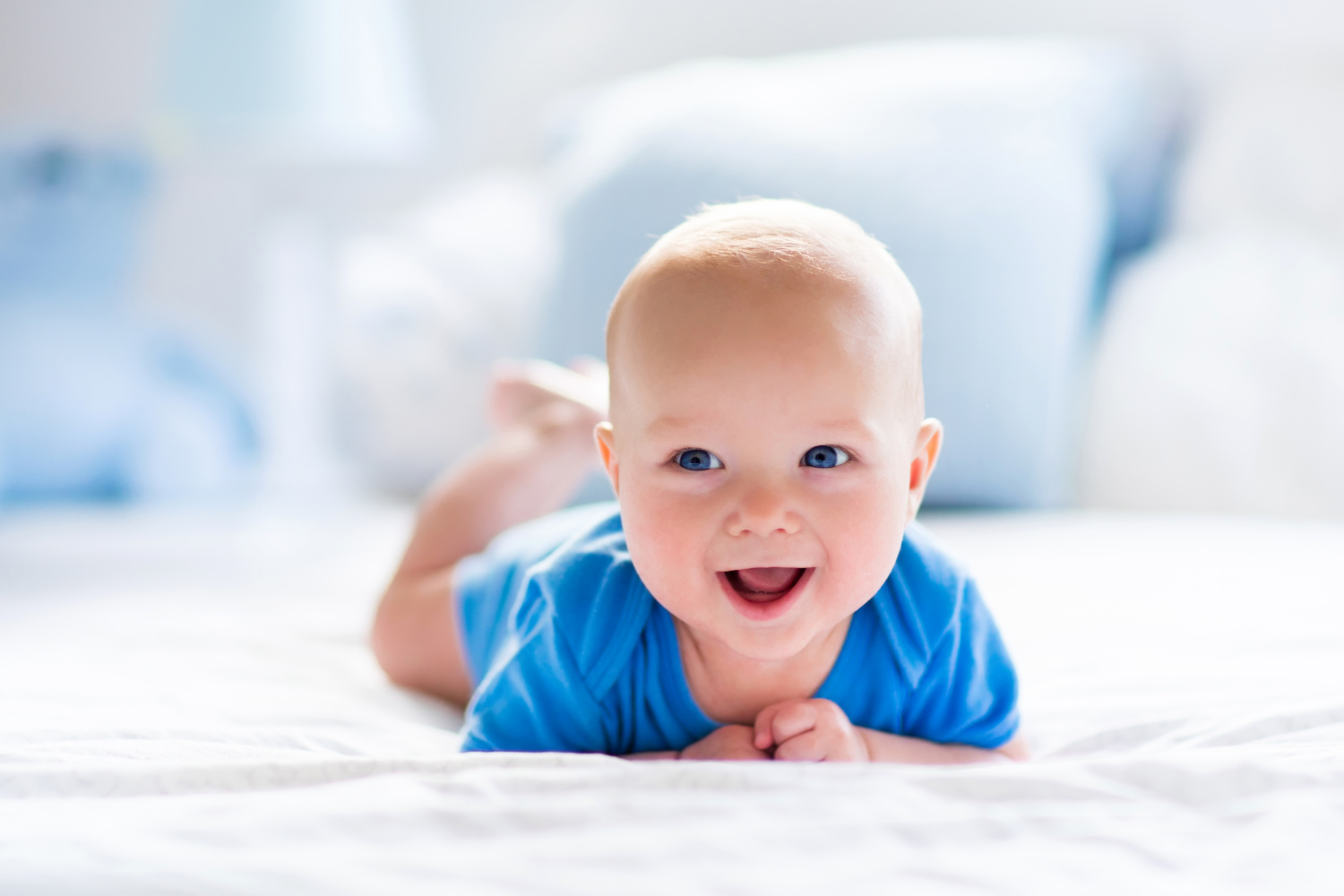Infant Growth and Development




Physical Development Milestones – Infants and Toddlers
2 Months :
- Holds head up when on tummy
- Makes smoother movements with arms and legs
- Relaxes hands from fists for short periods
- Grasps adult finger
- Kicks legs and wave arms while on back
- Primitive reflexes present, including the rooting and sucking reflex
4 Months :
- Holds head steady without support
- Brings hands to midline when laying on back
- Holds and shakes toys; swings at dangling toys
- Brings hands to mouth
- Pushes up on elbows when lying on tummy
6 Months :
- Rolls from tummy to back & may begin rolling from back to tummy
- Pushes arms straight when on tummy
- Begins to sit with support
- Supports weight on legs when standing with support
- Holds a toy in both hands at once
9 Months :
- Sits without support
- Moves into sitting position without support
- Transfers items from one hand to another
- Stands, holding on to adult or furniture for support
- Squats to pick up a toy while holding onto furniture.
- Picks up a toy using fingertips and thumb (pincer grasp)
12 Months :
- Pulls up to stand and walks along furniture for support (“cruising”)
- May take a few steps without support of an adult or furniture
- May stand alone
- Throws a ball with forward arm motion
- Drinks from a cup without a lid with adult support

Language Development Milestones – Infants and Toddlers
0 to 3 months :
- Smiling
- Turning their head toward different sounds
- Seeming to recognize your voice
4 to 6 months :
- Laughing
- Using their voice to express happiness or displeasure
- Babbling and gurgling, even when alone
- Apparent mimicking of sounds they hear
7 to 10 months :
- Understanding basic words like “no” and “bye-bye”
- Using a wider range of consonants and vowels
- Copying gestures and sounds
- Making sounds like “bababa” “mamama”
10 to 12 months :
- Responding to simple requests like “stop”
- Following simple instructions like “come here”
- Saying a few words, like “mama,” “dada,”
- Recognizing simple words for objects
- Immediately imitating sounds

Emotional Development Milestones – Infants and Toddlers
Month 1 :
- Makes eye contact
- Cries for help
- Responds to parents' smiles and voices
Month 2 :
- Begins to develop a social smile
- Enjoys playing with other people and may cry when play stops
- Prefers looking at people rather than objects
- Studies faces
- Gurgles and coos in response to sounds around him/her
- First begins to express anger
Month 3 :
- Starts a "conversation" by smiling at you and gurgling to get your attention
- Smiles back when you smile at him. The big smile involves his whole body -- hands open wide, arms lift up, legs move
- Can imitate some movements and facial expressions
Month 4 :
- Is intrigued by children. Will turn toward children's voices in person or on TV
- Laughs when tickled and when interacting with others
- Cries if play is disrupted
Month 5 :
- Becomes increasingly assertive
- Can differentiate between family members (parents and siblings) and strangers
- Likes to play during meals
Month 6 :
- May quickly tire of a toy but will never tire of your attention
- Temperament becomes increasingly apparent. You'll see whether he/she tends to be easy-going or easily upset; gentle or active
- Recognizes his/her own name
- Coos for pleasure and cries with displeasure
- Can make noises like grunts and squeals; clicks his tongue
Month 7 :
- Starts to understand the meaning of "no"
- Enjoys social interaction
- Expresses anger more strongly
- Tries to mimic adult sounds
Month 8 :
- Can differentiate between familiar and unfamiliar
- May become shy or anxious with strangers
- Cries in frustration when he can't reach a toy or do something he wants to do
Month 9 :
- Imitates gestures that other people make
- Looks at correct picture when an image is named
- Smiles and kisses own image in the mirror
- Likes to play near parent (i.e., in kitchen while Mom is cooking)
- May be more sensitive to the presence of other children
Month 10 :
- Separation anxiety may begin
- Self-esteem begins to develop
- Responds to positive recognition such as clapping
- Becomes cautious of heights
- Shows moods such as sad, happy, and angry
Month 11 :
- Tries to gain approval and avoid disapproval
- Can be uncooperative
Month 12 :
- May have temper tantrums
- Can fluctuate between being cooperative and uncooperative
- Shows a developing sense of humour
- May cling to parents or one parent in particular